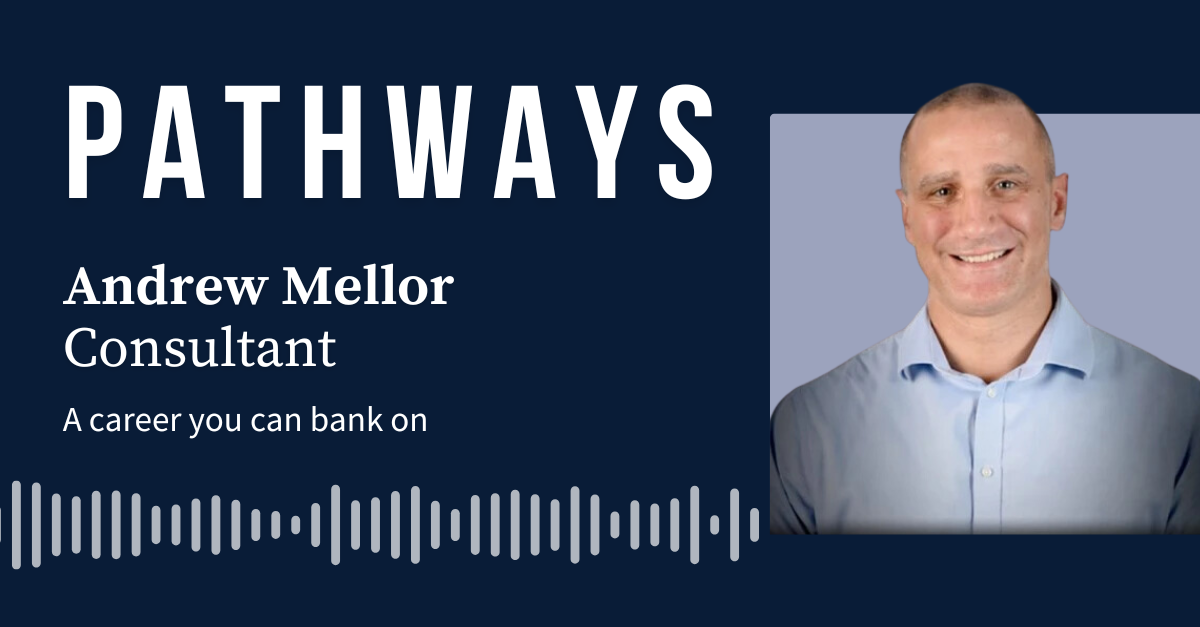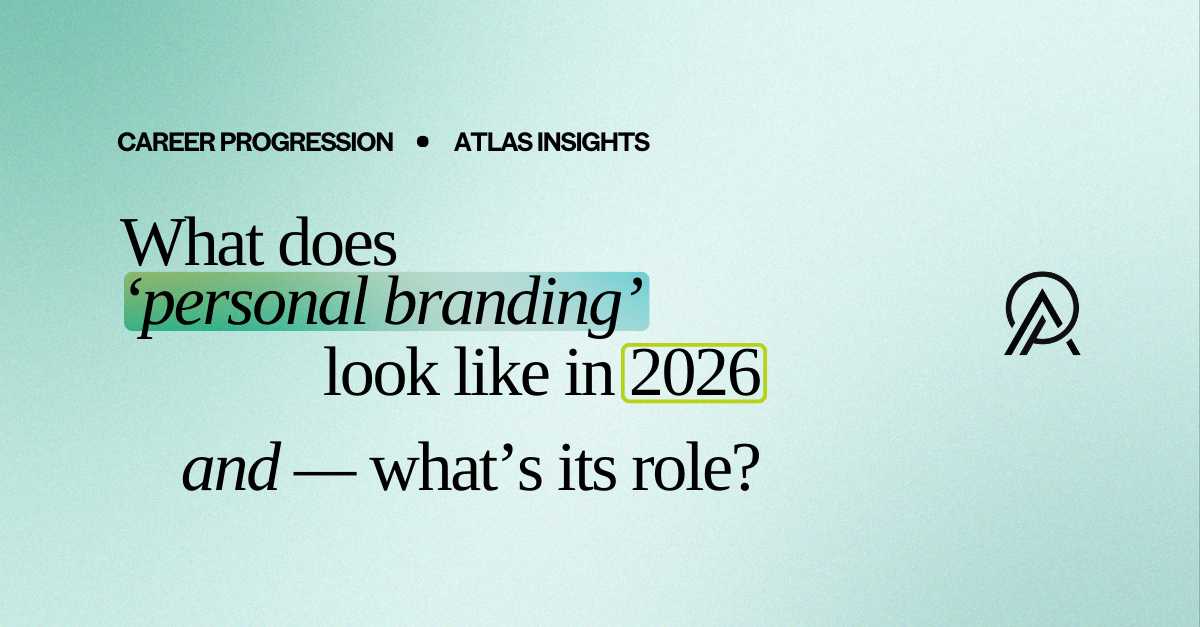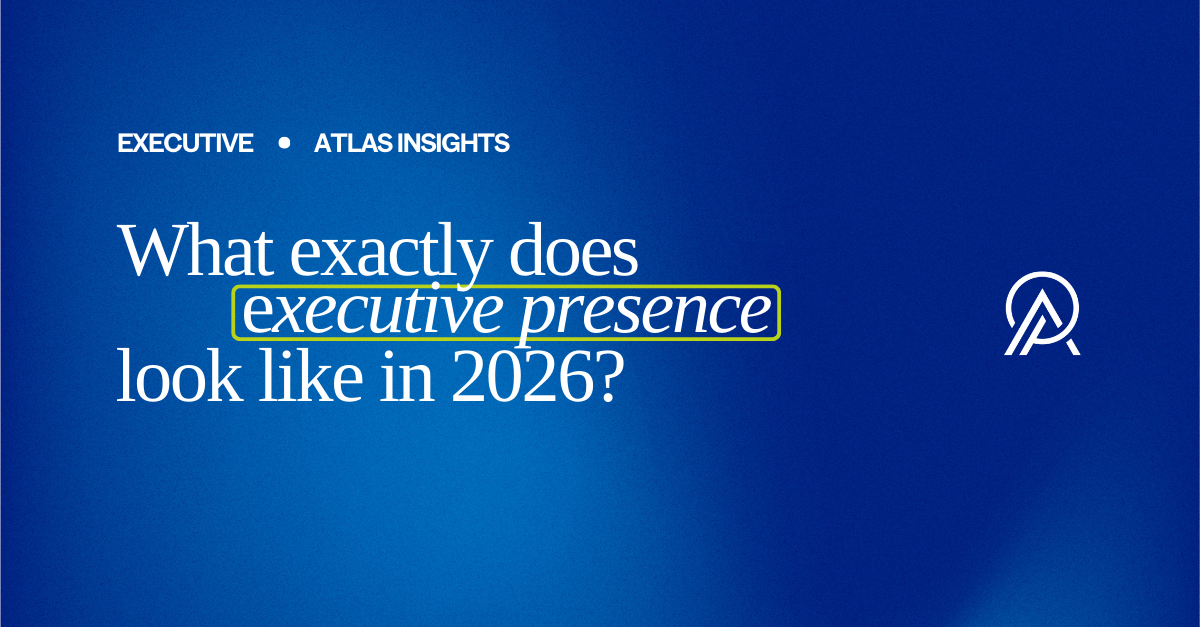
Andy Mellor has had a career that many could only dream of — he’s experienced it all, all around the world. A secondment as a fresh faced graduate would kick-off a 20 year stint abroad in the banking world, with Credit Suisse; returning to Australia to play a crucial role in the IPO, capital raising and sale of PointsBet. His wealth of knowledge and experience has led him to Consulting, currently advising GB Energy. He shared some of this wisdom with Atlas Director, Craig Gorton for our Pathways Podcast.
Craig GortonI’m here today with Andy Mellor. Andy has had a fascinating career trajectory, which he’ll take us through. He’s currently with GB Energy in a consultant role. Welcome, and thanks for joining us today, Andy.
Andy MellorThanks, Craig. Great to be here.
Craig GortonFantastic. First of all, let’s start at the beginning. If you could give me an overview of your career to date, including the early days, and I’d love to hear about the foundational learnings that still influence you today.
Andy MellorAbsolutely. I started life in Melbourne—born and bred. I went to Monash University, where I studied economics, then followed the traditional path into a chartered accounting firm. I began in 1994 at BDO Nelson Parkhill, as it was known back then, through their graduate program.
Those were great learning years—my first permanent role. I was fortunate to have the opportunity to work in their Kuala Lumpur office in Malaysia. I was seconded there in my third year, just after finishing my PY (Professional Year). That was my first trip overseas, and it opened my eyes to the wider world.
After returning to Australia, I resigned from BDO about six months later and moved to London in the late ’90s. There was a lot happening in London at the time—the banking sector was booming, and Australian, South African, and New Zealand accountants were in high demand.
I joined Credit Suisse and ended up spending 20 years there, from 1998 to 2018. Initially, I worked in their risk management team in London for four years, which gave me a deep understanding of trading businesses—equities and bond trading in particular. I realized I wanted to move into the trading space, and in 2004, I joined the Asian Trading Desk in London, covering European clients during European hours.
In 2006, I moved to Hong Kong with my wife and our first child. I spent 12 years there, eventually running the APAC convertible bond and high yield investing business from 2015 to 2018. It was an exciting time to be in Asia. China had just joined the WTO in 2001, and there was a lot of regional growth occurring. Of course, we also faced the challenges of the financial crisis.
Our team traded across a diverse set of markets, from highly developed ones like Japan and Australia to emerging ones like Indonesia and Vietnam. It was a great experience, but by 2018, it was time to return to Australia. My oldest daughter was starting high school, so the timing felt right.
I thought I’d stay in banking but was given the opportunity to join PointsBet, a corporate sportsbook. The company was pre-IPO when I joined, and I spent five years there, involved heavily in listing the business and leading capital raises, and eventually we sold our US business in 2023. That sale returned $450 million to shareholders, and in early 2024, I passed the baton to one of my team members, Alister Lui
Since then, I’ve been doing consulting work and am currently with GB Energy in Melbourne, which owns a a large gas asset off Gippsland which is to be developed into a long term underground gas storage operation
In terms of foundational learnings, I think the early days in a chartered accounting firm ground you well in how to operate. It’s a very client-facing environment—you spend a lot of time working in client offices.
A key takeaway for me has always been working with a sense of urgency. That was important in accounting, crucial in trading, and just as vital in a startup like PointsBet.
It doesn’t matter what job you’re doing or where you are in your career—you want to deliver high-quality work consistently. Be known for doing a great job.
I’d also say it’s important to maintain a positive, glass-half-full outlook, even when things are tough. And finally, honesty and integrity are non-negotiable in accounting, banking, or any CFO role. These principles should guide everything you do.
Craig GortonI completely agree. Honesty and consistency are essential across industries. Now, about your journey into banking—what attracted you to it, and was it what you expected?
Andy MellorIt was more of an opportunity that presented itself. Heading to London in the late ’90s, I knew there would be significant opportunities as banks were rapidly expanding their offices across Europe and the US.
When I walked into Credit Suisse in Canary Wharf for the first time, I knew it was where I wanted to be. The trading floor was electric—300 people, phones ringing constantly, and so much energy.
It was an exciting time, with tremendous growth across the business. People were regularly moving from risk management or product control into trading roles. Credit Suisse also encouraged global mobility, which allowed me to work in London, New York, and eventually Hong Kong.
Meeting people from diverse backgrounds and working in different cities made the experience incredibly rewarding. I was fortunate to work with many great people at CS.
Craig GortonExcellent. When you eventually returned to Melbourne, you transitioned into corporate leadership with PointsBet. Was that a challenging shift?
Andy MellorIt was an interesting transition. When I first came back, I thought a CFO role might be a good fit, but headhunters weren’t convinced since I hadn’t held a CFO role before.
The PointsBet opportunity came through my network. A good friend Sam Swanell, who was one of the co-founders, reached out for help with an IPO. I started as Chief Strategy Officer before becoming CFO post the IPO stage. I will always be grateful to Sam for giving me the opportunity.
It was a challenging and rewarding transition—PointsBet was a founder-led startup with only 50 staff when I joined. We grew to 650 over five years, expanding globally into the US. It was a steep learning curve, but the entrepreneurial spirit across the team made it exciting.
Craig GortonThere’s a really relevant point there in terms of the recruitment world. By the time you’ve got a couple of decades of experience under your belt, you’ve built a really strong network. Utilizing that network in the right way is really important, and I think it can sometimes be forgotten about. That leads me to my next question: what would your advice be to a CFO looking to transition into a new industry?
Andy MellorI think most people are very adaptable. Once someone has a decent amount of experience—even five or six years—they’re usually pretty adaptable across industries. Of course, there are technicalities that can help if you’re moving into an industry you know well. But I’d definitely encourage people to try moving industries. It’s incumbent on the individual to expedite their knowledge quickly.
When I joined the sports betting industry, I had no prior experience. I took the view that there are no silly questions. Asking questions, even ones you think you should know, is a great way to learn quickly. In the northern hemisphere—Europe, the US, Asia—the approach to education is often more classical. In the UK, for example, you don’t necessarily need an accounting degree to work in an accounting firm. When I moved offshore to Australia, I noticed that people were often transitioning between roles, industries, and different parts of organizations.
This adaptability brings fresh perspectives. For example, moving from sports betting to advising an oil and gas company might not seem like a natural progression, but the technology focus of sports betting companies brought a unique viewpoint to the engineering-focused oil and gas sector. Transitioning industries can be risky, and it requires someone—whether it’s a board, CEO, or recruiter—to take a chance on you. But calculated and well-thought-out risks can pay off.
Craig GortonAbsolutely. It’s also a smart way for a business to innovate, bringing in individuals from different industries with fresh ideas.
Andy MellorAbsolutely.
Craig GortonWhat would you say are the top three lessons you’ve learned as a CFO?
Andy MellorGood question. The first thing is to be really effective as a CFO, you have to truly understand the business. Of course, you need to know the numbers inside out and have great attention to detail, but you also need to spend time with different business leads and teams. For instance, at PointsBet, I spent time with technical teams, engineers, and software developers to understand what was happening behind the scenes of the app. I also worked closely with marketing teams to analyze the efficiency of campaigns and identify areas for improvement. This broad understanding helps you marry operational insights with the numbers, adding value to executive and board meetings.
The second lesson is clear communication. Depending on your stakeholders, delivering the right message is critical. Over the years, I learned that less is more. Initially, our board and investor packs were lengthy, but we shifted to summaries with appendices. It’s about ensuring the person reading your information gets exactly what they need to make decisions efficiently.
The third lesson relates to team development. When I joined PointsBet, the finance team had five people; when I left, it had grown to 36 across the globe. Building the right team structure, providing them with the right tools, and clearly communicating the vision were critical. People need to know their role in the journey. Lastly, as any CFO knows, cash flow is king.
Craig GortonOf course! Can’t miss that one. Focusing on your time overseas, you’ve worked across the globe with Credit Suisse. Would you recommend this path for gaining experience and progression?
Andy MellorI’d definitely recommend spending time in different countries. It wasn’t a planned move for me—opportunities just arose, and I took them. It wasn’t always smooth sailing; for instance, the 2008 GFC brought challenges. But exposure to different people, cultures, and ways of thinking is invaluable.
You do need to be mindful of how long you stay away. I left Australia at 24 and returned at 44. While I gained a lot of experience, it wasn’t always as valued as I expected upon returning. Many expats face a reintegration period. My advice is to think it through—leaving at 24 and returning at 54 might be too long. But stepping out of your comfort zone, whether internationally or even interstate, can be highly beneficial.
Craig GortonThat’s a great point, especially for Australians looking for opportunities overseas.
Andy MellorAbsolutely.
Craig GortonLet’s talk about mentors. Has anyone had a particularly strong impact on your career?
Andy MellorI’ve been fortunate to work with open, straightforward people. Whether it’s a mentor, your boss, or a colleague, having someone you can have honest conversations with is critical. At PointsBet, we had a mentorship program where board members mentored the executive team, and it worked really well. You need someone you trust to give you honest feedback. This doesn’t have to be the same person throughout your career; as you evolve, you might seek out different mentors.
Craig GortonGreat advice. I agree—mentors can provide different levels of value as your career evolves. Finally, any advice for future leaders reading or listening to this?
Andy MellorStart by building a strong relationship with the person you report to. It’s an invaluable source of learning. I’ve found that people don’t ask their leaders for advice as much as they could, but most leaders are more than willing to offer guidance.
On the flip side, being a good leader means understanding your staff. Even during tough times like restructuring, maintaining open communication and ensuring your team knows their role in the journey helps create a cohesive environment. Leadership is about balancing the difficult decisions with a vision your team can align with.
Craig GortonThank you, Andy. Some absolute nuggets of wisdom there. I really appreciate you joining us today.
Andy MellorThanks very much, Craig. I appreciate it.




